- Home
- Lin Carter
The Valley Where Time Stood Still Page 4
The Valley Where Time Stood Still Read online
Page 4
A cold chill went through M’Cord’s blood as he listened to the slow, tortured words the other whispered there under the cold glitter of the stars.
For now that elusive scrap of memory that had stirred in the depths of his mind had risen up within him. And now he knew what it was that the other had meant by huatan—the sacred valley. He understood what Thaklar had been talking about, and he knew, or thought he knew, what the secret had been that the Hawk princes of Thaklar’s line had guarded so carefully and for so long.
With a faint horror he realized what it was that the warrior at his side had done that had earned him the contempt of his clan brethren and lifelong exile from their camps.
He had betrayed the way to the Garden of Eden out of desire for a woman’s body. *
V. To the Gates of Ygnarh
They went on with dawn, marching north toward the plateau. They spoke few words between them, for the fever was growing in M’Cord and the pain was there within him like a small burning fire. As for Thaklar, a black mood of murderous depression was upon him and he strode along wearily, head bent, thinking his own thoughts.
M’Cord pitied him, even in his own torment. For he understood the enormity of Thaklar’s sin.
Ophar, or “The Holy,” as it is called, is the Eden of the religion of the natives of Mars. The Valley Where Life Was Bom, they call it. It was there, in this mysterious and sacrosanct Valley, according to myths that are older than the mountains, that the Timeless Ones first created life. It was in that secret place that the Martian Adam was molded from the flesh of beasts, was shaped to manhood, and was given that spark of immortality that distinguishes the man from the beast.
But it is more than just the cradle of the race; for The Holy hides within its breast the most precious of all the many gifts the Timeless Ones bestowed upon their fosterchildren. And that is the Jhay yam-i-Jaah itself, the Pool of Eternity which contains the Water of Life. Think of it as the Martian equivalent of the Fountain of Youth, which that grizzled and gullible old soldier-of-fortune, Ponce de Leon, once searched for in the fever-swamps of Florida, and you will not be far off the mark.
This was all legend and myth, of course, and M’Cord knew it. It was the stuff of fairy tales. M’Cord had seen too much of life to believe in any man’s gods—not even those of his own people, and certainly not the strange gods of an alien planet. But holiness is a measure of reverence and awe which men hold for certain symbols and stories, and it has nothing to do with fact or truth or the real world. Men need their myths as they need their heroes: it is necessary to believe in something greater than oneself to avoid yielding to disgust and contempt for everything, including oneself.
For some the holy thing, the sacred thing, is Home or Flag or Country. For other men it is a way of life, a creed or a political system or an ethical standard. But for many men it is a collection of old, age-neglected tales in a Book. M’Cord had no faith in the Book, whether it be the Book of his own Christian ancestors or the Book of the Martian religion. But he knew how much it meant to them, the dwindling remnants of a dying people. And he understood at last the full horror of what Thaklar had done.
The rest of the story leaked from Thaklar’s tight lips in bits and pieces over the next two days. He had told the secret to the dancing girl to prove that his love for her was stronger even than his hereditary vows, stronger than his honor. And before he had clasped her in his arms even once, she had fled in the night on a stolen slidar, and was gone into the trackless wastes. She had only toyed with him, as a cat toys with a helpless small thing, cruelly, playfully, with sharp claws sheathed in soft velvet until the final moment of truth.
M’Cord did not believe that even Thaklar held the ancient myths to be true. But that did not matter in the least. It was enough to know that he had betrayed the honor of his House for a taunting, laughing wanton. He had spat upon the graves of his ancestors. He had sold the precious treasure of his fathers for the flesh of a woman, which is a sin infinitely more despicable than to have sold it for power or gold. He had gone that very hour before the old Prince of his nation to confess his sin, which was beyond redemption as it was beyond punishment. His name had been taken from him there, and the princedom of his House had been cast down in the dust. A nameless, tribeless wanderer, he had been driven forth from the camps of his people to walk the world in bitter loneliness until death came for him.
There was no longer anything for him to live for. But there was one thing, one desire he nourished in his heart that was fiercer and deeper even than had been his desire for the woman.
And the name of it was Revenge.
M’Cord was stronger and tougher than even he, himself, had dreamed. He had thought the fever would come upon him in hours, but his blood fought and held the sickness at bay for two days. At last, however, his strength failed him and he sank into the raving madness. Thaklar tended him, fed him, gave him water, and bound him to the saddle so that he could not fall. And into the food and drink he mixed the medicines as M’Cord had bidden him during the time when he had been lucid. He followed these instructions although he placed no credence in the medicines of the Outworlders.
At night, bone-weary, he huddled by M’Cord and talked to him in low, quiet tones. The Earthman was gaunt and wasted by now, and his eyes were bright with madness; he writhed and raved in his bonds.
Thaklar talked to him because there was nothing else to talk to but the desert and the silence, the night and the stars. Perhaps he thought the sound of a human voice might soothe and calm M’Cord in his madness. And perhaps it did, a little. But it is more than likely that he talked merely to unburden his soul and keep himself sane.
He had wandered the world over (he told M’Cord), searching for the dancer Zerild. He sought her in the encampments of the People, and among the caravans of the fat merchants, and even among the despised F’yagha, in the native quarter of the Earth colonies.
He sought word of her everywhere; but he learned nothing and he found her not.
Then it had occurred to him, with a cold thrill of unholy fear, that mayhap she had not wheedled the secret from him merely to satisfy her sense of power over him, but for gain and for a purpose.
The only purpose his mind could envision was the old, familiar reason—the motive which drove men on every world to search for the Unobtainable. The motive which drove the old Spanish conquistadores to explore the wilderness of unknown America for their own Fountain of Youth. And the name of that motive was the fear of death, of growing old. For it was written in The Book that whoso drank of the Pool would become young and strong again, never to age and never to die.
And a woman like Zerild, who earns her gold by tempting men with her beauty and by flaunting her youthfulness before their lust, fears nothing so much as age, with its silver hairs and its wrinkled flesh.
Now the first step on the Road of Millions of Years was in the city called Ygnarh.
It was old, that city: older than the Carboniferous. So old that even the legends did not recall when first its pillars had been raised against the sky. It had died so long ago that even the Epics did not remember a time when it had been the habitation of men. “The first of cities,” it was named in The Book; it was like the Land of Nod, wherein had Adam settled first when he had been driven to the east of Eden and that gates of paradise were closed behind him by an angel with a sword of fire.
If ever there had truly been a city called Ygnarh, Thak-lar believed that he would find it in the Sabaeus Sinus Plateau. This had been part of the secret his family had guarded from time immemorial; and the reason why the Road of Millions of Years had been kept secret was to prevent men from seeking Ophar the Holy wherein lay the Water of Life, for to bathe therein would be blasphemy. Very long ago the gods decreed that it was not good for a man to live forever, or to dwell in the Valley Beyond Time, where once the gods themselves had walked. So the way thereunto was forbidden and the road was made secret, and the guardianship of that secret was given into the hands of the founder of the
House of Thaklar.
From that day to this, no man of that House had revealed the secret to an outsider; when the father lay dying, then and then only was the secret whispered to his eldest son. Thus it had been for ages. And only Thaklar had betrayed that ancient trust.
He could never win forgiveness for his sin, he knew. But he could slay the woman who had coaxed it from him, and forever close her lips in silence. That would at very least satisfy him; it would do much to remove the burden of guilt which weighed like lead upon his spirit. And to that purpose he had devoted himself. He had been bound for Ygnarh when his beast had collapsed beneath him, pinning him down there in the Aram, where the Outworlder who was now his brother had found him.
Why the beast had died he never knew. It was the way of slidars, who can lope strong and tireless and uncomplaining for hundreds of leagues. When they have reached the end of their strength, they die all at once, as if struck down. It is the way of slidars.
M’Cord’s beast succumbed on the third day. Suddenly it uttered a blood-chilling hiss and came to its knees, head lolling drunkenly. Alarm flashed through Thaklar, rousing him from his weary stupor. He sprang forward, a hooked knife glinting naked in his fist. Barely had he cut the unconscious figure of M’Cord loose from his bonds and dragged him from the saddle when the slidar fell over on its side in the dust and lay there panting for a few moments before it died.
Thaklar stared at the dead beast, then raised his eyes to the mountainous wall of the plateau that marched across the horizon to the north. It looked near; it looked very near. But he knew it was not, and his heart quailed within him.
He could carry the saddlebags, because he must. Therein were stored the food and the water, the blankets and the medicines.
But he could not carry M’Cord.
Even gaunt and wasted and shrunken with fever, the Earthman was a cumbersome burden. And Thaklar knew that his broken leg, although it was healed by now, was not strong enough to bear that burden.
But there was nothing else to do but—try.
Little enough of his tarnished honor remained to him. That little he clung to with all the strength and determination he possessed. And never should it be said of Thaklar of the Dragon Hawk nation that he had left a brother behind to die in the dustlands, while^he went forth, alone, to live.
He bent over the dead beast and removed the saddlebags with some difficulty, since they were partly pinned under the carcass.
Then he judiciously searched through their meager stores, discarding everything that could safely be dispensed with, everything that was not absolutely vital to their survival.
That which remained he bundled up in the leather bag and slung it about him, clipping it to the rings of his harness so that it hung down upon his breast.
Then he bent down, gently picked up M’Cord, and slung the unconscious man over his shoulders, adjusting the weight until he could bear it comfortably.
“Very well then, my brother,” he said harshly. “From henceforward I shall be thy riding-beast. And live or die, we shall meet our fate together. …”
He walked off into the north with the Earthman on his back.
The plateau was nearer now, but not near enough. He could reach it within three days, he thought; in three days, if the old tales told true, he would enter the gates of Ygnarh.
But whether M’Cord would live that long, only the Timeless Ones knew.
VI. Zerild
It was a dream, M’Cord thought; always the same dream. But this one was strangely different… .
The dust, the endless drifts of powdery ochre dust, were gone as if swept away by a magician’s word. In place of the dust was naked rock, pitted and scored and crumbling and very old. The rock closed about him in steep, towering walls that narrowed like the jaws of a vise.
And then, just as he dreamed the jaws of the vise would close upon him, they opened, quite suddenly, into a wide and open place that lay naked beneath the sun.
And in that place there stood a city.
It was very old, that city. Older than man’s memory; older even than man’s dreams.
It was the skeleton of a city, really. Crumbling walls that still stood, although their domed roofs had fallen in; pillars that leaned crazily awry, or lay fallen and shattered and moldering into dust.
The gates still stood, by some jest of time or fate. The gates and the pillars of the gates still rose up, stem and forbidding, although the walls of the city themselves had long ago fallen to break and sunder and lapse into the detritus of the ages.
That which bore him on its back—the haggard, stumbling scarecrow of a man—lurched through the gates, which hung open.
Down a long avenue of paving stones he staggered. It was lined on either side with houses, or the remains of them. Like sun-bleached skulls, they were, the houses; mere empty shells with hollow windows that gaped black and empty as the eye sockets and unbarred portals that yawned like the opened jaws.
Everywhere was dust and desolation and scattered stones and the bare bones of fallen towers. Oh, it was a strange dream, this one! M’Cord tried to laugh at its craziness, but he could not, for his tongue was black and swollen.
In the central plaza the buildings still stood to the height of two or three stories. They had been built to last, these palaces or temples or whatever they once had been; and their stout walls of pale amber marble had stood strong against the remorseless erosion of a million years and more.
That which bore him set him down there in the shadow of a wall, and knelt beside him and set water to his lips. It was precious, that water, more precious than gold or even blood, and few were the drops that were left. They shared it between them, the scarecrow and the corpse that dreamed it was still alive.
Then they rested until the others came.
When they heard the scrape of boot-leather against dusty stone, the scarecrow staggered to its feet again, one claw-like hand on the butt of its gun, but it was too late, for the muzzles of three energy guns stared at them fixedly, like cold, black, unwavering eyes.
Slowly Thaklar let his hand fall and dropped the pistol to the pave.
The others stared at him and at the sprawled corpselike figure of M’Cord with hard, cold, thoughtful, measuring eyes for a long, long moment of tension and aching silence.
The first of them, who must have been their leader, judging from his stance, was a lean, rangy wolf of a man. A Low Clan warrior, with seamed leathery face and hard, small, suspicious eyes. He wore two bandoliers which criss-crossed his broad, hard-muscled chest, and a gun sat in its holster on each hip, and a thick black whip with a worn silver handle hung coiled there, as well. In his dark capable hands he held an electric rifle of F’yagha manufacture. He held it with that casual ease borne of long familiarity and use. He knew how to use it, Thaklar knew, and he might very well use it at any moment.
The other man was small and stunted like a dwarf, and gaunt in the ribs, and very old. His furcap was shaven and he wore sigils of silver clipped to his ear-lobes, like a priest. But he, too, wore the leathern tunic and harness of a warrior, not the billowing robes of an ecclesiastic. If the face of the leader was lean and hard and dangerous as a wolf’s, the small man’s face was like that of a snake. Indeed, the resemblance was uncanny: the same blunt, wedge-shaped brow; the same narrow, tapering, chinless face; and the same cold, unblinking, lidless eyes, empty of all save ferocity.
He hissed a word to his companion between thin lips. And as he did so, Thaklar half fancied he saw the pointed tip of a forked tongue flicker out to moisten dry lips.
The third of the party stood to one side in the shadow of a pillar which had everything but the long barrel of the rifle which was pointed directly at his heart.
He ignored the others, and met the cunning, suspicious eyes of the wolf-like one, holding them with his own.
It was a moment of indecision: a moment of wavering and of trial. It was also a good moment for a bluff, and Thaklar knew it.
These me
n were outlaws, he knew. They wore no clan markings and their garments were unfringed with the tartan-like patterns that are as heraldic blazons to the Martians. Outlaws or outcasts, with the hand of every man raised against them. They feared him because he was an unknown factor; and they feared him because they could not be certain he was alone.
It was a moment that could easily and swiftly end in death, he knew. It was a moment to put fear behind him and to don a casual and fearless stance. But he was afraid, was Thaklar. Any man would have felt fear there in the empty, lifeless square under the dull blaze of the sun, pinned like a moth between the pointing muzzles of the three guns.
But the blood of ancient kings flowed in the veins of Thaklar, and the pride of an ancient heritage stiffened his spine. He would die if he must, but he would not show fear in the face of death. He drew himself up proudly and folded his arms upon his breast and matched the wolf-like man stare for stare. And when he spoke, his words were calm and measured, and his voice did not tremble in the slightest.
“You need not fear me. My guns are at my feet and I am alone, save for the man there, who is half dead of fever. And I am an outlaw, like yourself.”
The wolf-faced man sucked in his breath between bared teeth, whistling sharply. His eyes glittered warily beneath the shadow of his kaffira headdress.
“Who is this that knows Chastar, but upon whom the eyes of Chastar have never rested before?” he demanded. His voice was fierce and high and tight with suspicion.
Thaklar shrugged indifferently.
“I know you not, nor have we ever met, to my certain knowledge. But who would dwell here in a dead city in the middle of nowhere but one with a price on his head?”
The glint of suspicion seemed to dim a trifle as Thaklar’s words went home. It was as much the casual, uncaring tone in which they were spoken as it was the import of the words that dulled those suspicious fires.
The man who called himself Chastar said in a harsh voice: “Kick your gun over here with your foot, and make no sudden moves.” Thaklar calmly did as he was bidden. Still without taking his eyes off Thaklar, the outlaw said to the dwarfish little man whose head was shaven like a priest’s, “You. Pick it up.”

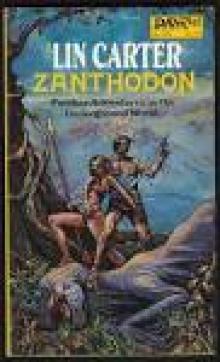 Zanthodon
Zanthodon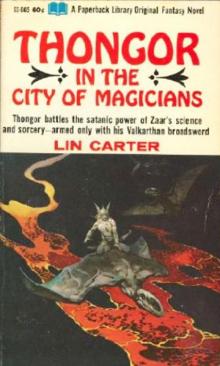 Thongor in the City of Magicians
Thongor in the City of Magicians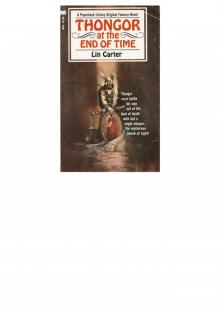 Thongor at the End of Time
Thongor at the End of Time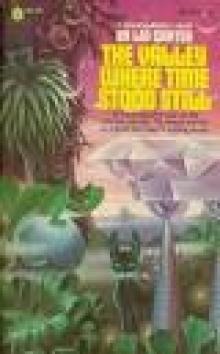 The Valley Where Time Stood Still
The Valley Where Time Stood Still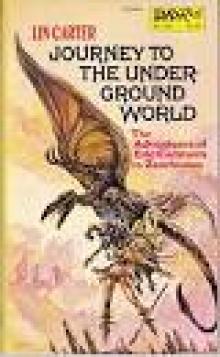 Journey To The Underground World
Journey To The Underground World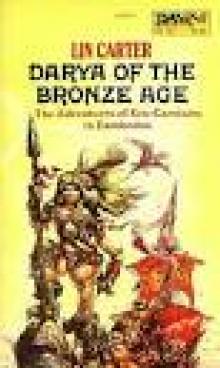 Darya of The Bronze Age
Darya of The Bronze Age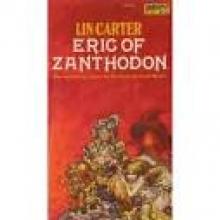 Eric of Zanthodon
Eric of Zanthodon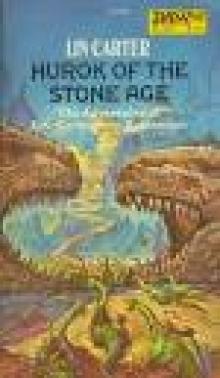 Hurok Of The Stone Age
Hurok Of The Stone Age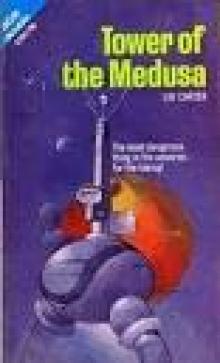 Tower Of The Medusa
Tower Of The Medusa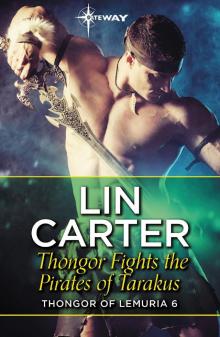 Thongor Fights the Pirates of Tarakus
Thongor Fights the Pirates of Tarakus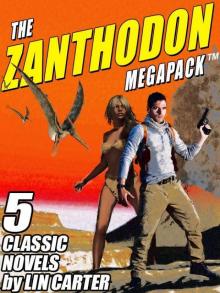 The Zanthodon MEGAPACK ™: The Complete 5-Book Series
The Zanthodon MEGAPACK ™: The Complete 5-Book Series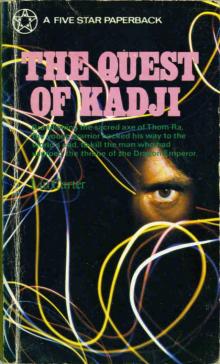 The Quest of Kadji
The Quest of Kadji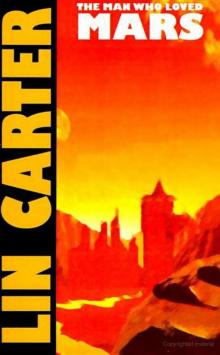 Lin Carter - The Man Who Loved Mars
Lin Carter - The Man Who Loved Mars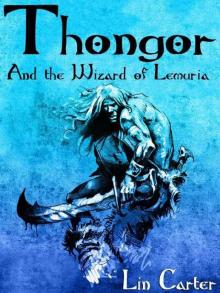 Thongor and the Wizard of Lemuria
Thongor and the Wizard of Lemuria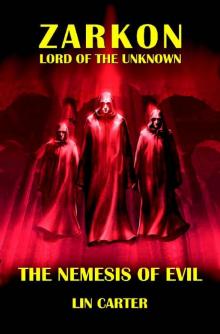 The Nemesis of Evil
The Nemesis of Evil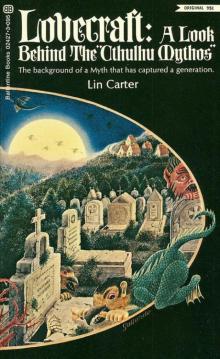 H.P.Lovecraft: A Look Behind Cthulhu Mythos
H.P.Lovecraft: A Look Behind Cthulhu Mythos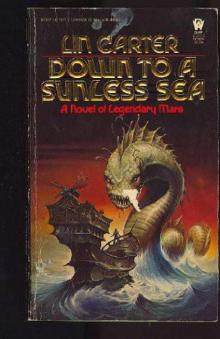 Lin Carter - Down to a Sunless Sea
Lin Carter - Down to a Sunless Sea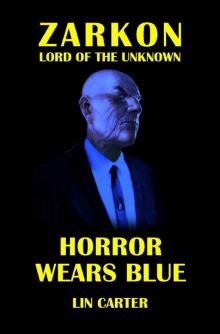 Horror Wears Blue
Horror Wears Blue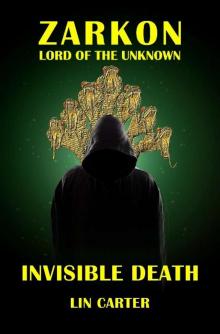 Invisible Death
Invisible Death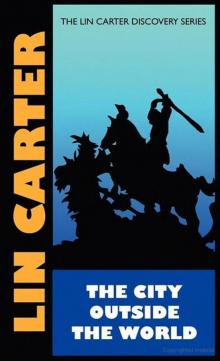 Lin Carter - The City Outside the World
Lin Carter - The City Outside the World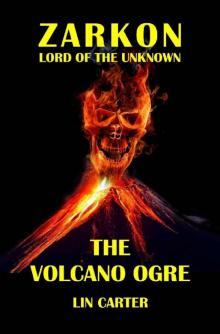 The Volcano Ogre
The Volcano Ogre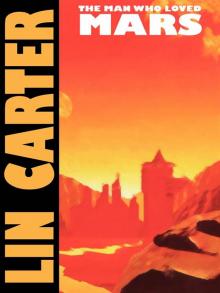 The Man Who Loved Mars
The Man Who Loved Mars